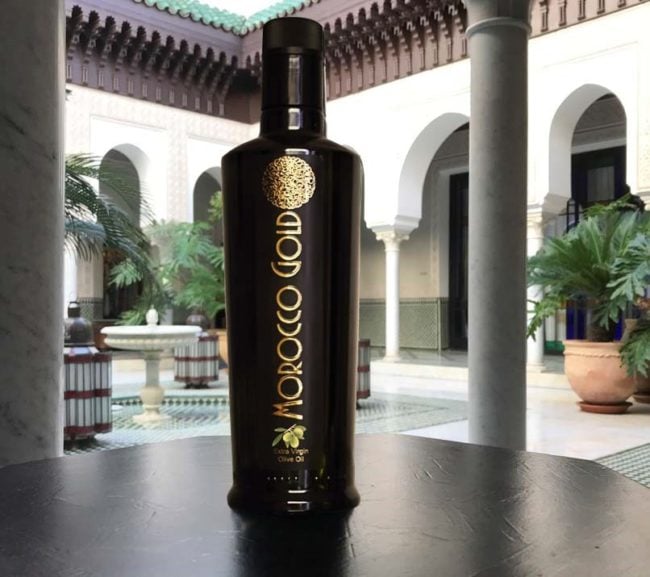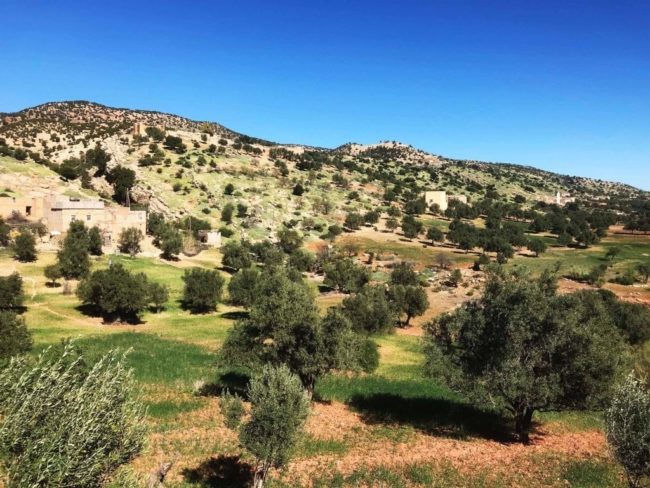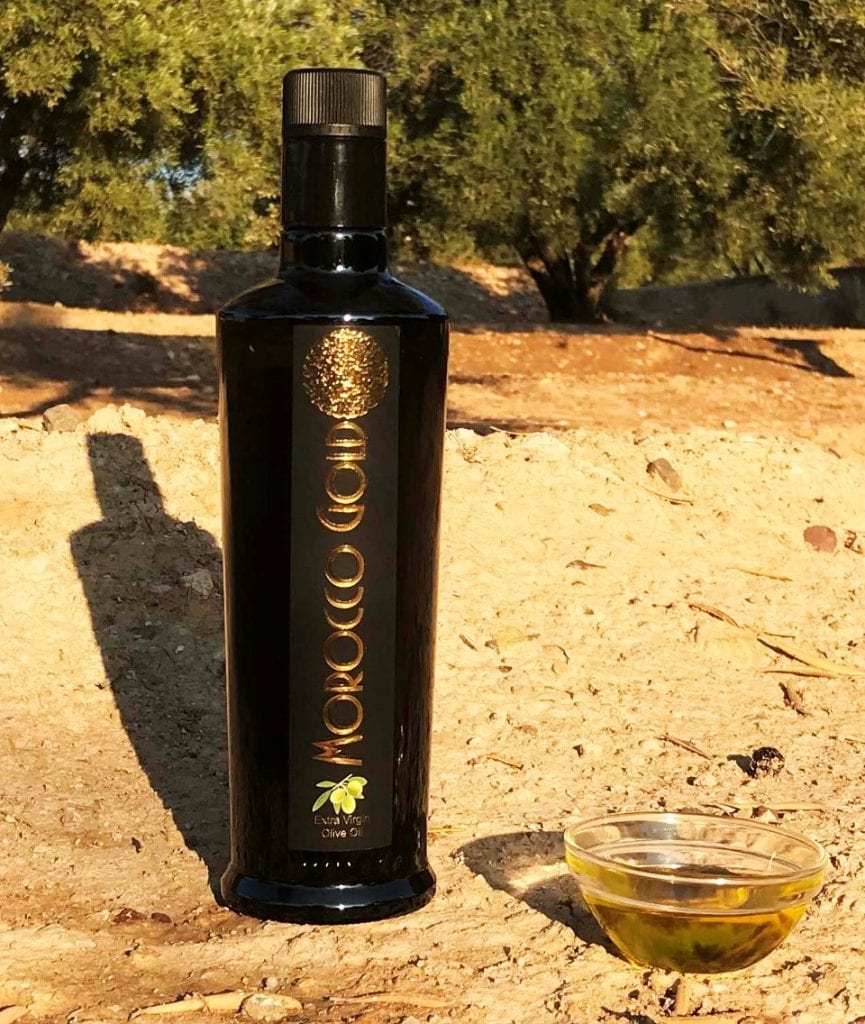What Makes Our Extra Virgin Olive Oil So Special? – It’s High Polyphenol level
Updated February 2nd 2023

SUMMARY:
- Morocco is now being recognised as a leading producer of some of the finest quality extra virgin olive oils – like Morocco Gold.
- This is due to the high levels of polyphenols in Moroccan extra virgin olive oil.
- Morocco Gold extra virgin olive oil is especially high polyphenols, making it unmatched for quality, taste and health benefits
CONTENTS:
- Why Moroccan Extra Virgin Olive Oil Is Gaining In Popularity
- Quality & Quantity Of Moroccan Extra Virgin Olive Oil
- Why We Believe The Best Extra Virgin Olive Oil Is Made In Morocco
- What Is Extra Virgin Olive Oil?
- Best Extra Virgin Olive Oil Production
- Best Extra Virgin Olive Oil Taste
- Best Extra Virgin Olive Oil Is High In Heath Enhancing Poyphenols
- What Is So Special About Morocco Gold Extra Virgin Olive? : It’s Polyphenol Level
Why Moroccan Extra Virgin Olive Oil Is Gaining In Popularity
There’s a reason why Moroccan extra virgin olive oil has been gaining popularity in the recent years. Extra virgin olive oil has long been a delectable culinary must-have, but now, Morocco is being recognized as the best new source of quality extra virgin olive oil in the world!
Why? It all comes down to polyphenols. Polyphenols are antioxidants that provide Moroccan olive oil with its unique flavour, powerful health benefits such as improved cardiovascular health and reduced risk of chronic diseases.
In comparison to other varieties of EVOO, Morocco Gold extra virgin olive oil is especially high polyphenols, making it unmatched for quality, taste and health benefits. So for those looking for a premium extra virgin olive oil, Morocco Gold extra virgin olive oil should be your go-to!
Its fantastic taste and health benefits make Morocco Gold extra virgin olive oil the ideal choice for consumers who want the best quality extra virgin oil and help to establish Morocco as one of the leading sources for top notch extra virgin olive oil around the world.
At Morocco Gold, we know that extra virgin olive oil has a long history in the ‘traditional’ Olive Oil producing countries of Spain, Greece and Italy. But did you know that Morocco has been producing high quality olive oil for millennia, from the time of the Romans?
The existence of centenary trees and traditional presses (maasras), testify to the antiquity of olive oil production. Indeed, olive oil has long been considered a noble food by the local population.
Morocco is now the fourth largest producer of olive in the world, (Morocco harvested an estimated 2 million tons of olives in 2018/19 harvest).
Quality And Quantity Of Moroccan Olive Oil
Our dedicated team at Morocco Gold are not just producing more olive oil, they are producing the best quality extra olive oil with the highest ever concentration of health boosting polyphenols. Polyphenols are powerful antioxidants which help your body fend off a range of diseases, reduce inflammation and contribute to better heart health.
Why We Believe The Best Extra Virgin Olive Oil Is Made In Morocco

The benign climate makes Morocco a ‘Garden Of Eden’ on the doorstep of Europe and the ideal location for olive cultivation with mild winters and warm, dry summers. The soils in the main olive-growing regions are rich and deep, and generally have an equal balance of clay and coarse sands.
Morocco Gold extra virgin olive oil comes from groves in the foothills of the Atlas Mountains. The specific soil conditions of the Beni Mellal region, together with the mild winters and summers, caressed by hot winds from the Sahara, make ideal growing conditions for Morocco Gold olives.
Nurtured with love for generations, using only traditional, natural methods, Morocco Gold retains its distinctive flavour to offer the finest sensory experience.
As reported by the Olive Oil Times, quality of olive oil depends on several factors including the type of soil, climate conditions, olive cultivar and farming techniques, as well as the methods used to extract olive oil.
Researchers analyzed 279 samples of Moroccan olive oil from the predominant Picholine Marocaine cultivar that is grown in seven regions of North Morocco.
Using the standards set by the International Olive Council (IOC), the researchers classified 94 percent of the Moroccan olive oils from the studied regions as extra virgin oils, while only 6 percent were classified as virgin olive oils.
What Is Extra Virgin Olive Oil?

Extra virgin olive oil is a wholly natural, unrefined oil and the highest quality olive oil you can buy. Genuine extra virgin olive oil is rare and as a result is slightly more expensive. The definition of extra virgin olive oil is very precise regards production methods, taste and chemical composition.
To qualify as extra virgin olive oil, it is an olive oil of less than 0.8% acidity and has no taste defects. In practice, the very best extra virgin olive oils have acidity levels much lower. Morocco Gold extra virgin olive oil is consistently below 0.5%, normally around 0.25% to 0.3% depending on the weather conditions throughout the growing season.
Extra virgin olive oil is completely natural. It is not treated with chemicals or altered by temperature. It is typically has a golden-green colour, with a distinctive fresh, green flavour and a light peppery finish.
Best Olive Oil Is Extra Virgin Olive Oil
How the fruit was grown, harvested and transported, how it was pressed into oil, and how the oil was packaged and bottled all contribute to ensure extra virgin olive oil like Morocco Gold is the best quality olive oil you can buy.
This means it is an olive oil of less than 0.8% acidity and has no taste defects.
Best Extra Virgin Olive Oil Is Single Estate:
This means that it is from one source and is not mixed or blended with other oils, (even if they are extra virgin olive oil).
Best Olive Oil Production:
How the fruit was grown, harvested and transported, how it was pressed into oil, and how the oil was packaged and bottled all contribute to ensure extra virgin olive oil like Morocco Gold is the best quality olive oil you can buy.
The best extra virgin olive oils are produced when the olives are young and green. They are hand-picked and handled with care and attention throughout the harvesting process. The olives are pressed using solely mechanical means within 24 hours of picking at temperature of below 28 º C.
Because of the way extra virgin olive oil is made, it retains more true olive taste, and has a lower level of oleic acid (no more than 0.8%) than other olive oil varieties. It also contains more of the natural vitamins and minerals found in olives.
Best Extra Virgin Olive Oil Taste
The taste characteristics of best extra virgin olive oils are:
Fruity : having pleasant fruit flavours characteristic of fresh ripe or green olives
Bitter : with a mostly pleasant acrid flavour sensation on the tongue
Pungent : giving a distinctive peppery sensation in the mouth and throat. This is a sign of abundant nutrients in good, fresh extra virgin olive oil.
Tasting extra virgin olive oil is similar to wine tasting. You want to pour a small amount of the olive oil into a glass and place the bottom of the glass in the palm of your hand to warm up the oil. Gently swirl the glass to release the extra virgin olive oil aromas. Then sniff the olive oil and note the aromas – does it smell like grass or fruit?
Next, take a small slurp and suck the extra virgin olive oil to the back of your throat – this spreads the olive oil throughout your palate and helps release the flavours. Lastly, swallow your extra virgin olive oil and take note of the flavours and any bitterness or pungency. A good extra virgin olive oil will give you a slight burn after you swallow. This indicates the olive oil is rich in antioxidants called polyphenols. Bitterness at the back of your tongue tells you it’s pure.
Bitter, pungent and fruity are positive flavour attributes of extra virgin olive oil. You don’t want your olive oil to taste mouldy, yeasty or muddy. If it smells like crayons or stale nuts, it’s likely old and the oil has gone rancid.
Best Olive Oil Is High In Heath Enhancing Poyphenols:
Thanks to the recent spotlight on the Mediterranean Diet, extensive research has been done on the phytonutrient composition of extra virgin olive oil. What has been discovered is an extensive list of phytonutrients; one of the most praised is its polyphenols. The amount of polyphenols found in extra virgin olive oil is truly amazing!
Polyphenols are a potent antioxidant – one that can decommission a nasty molecule in your body called a free radical. Free radicals can ricochet around inside your body and harm good cells. Antioxidants, such as the polyphenols found in extra virgin olive oil, work to neutralize free radicals; protecting the body from their harmful effects.
The European Food Safety Agency has now approved health claims for extra virgin olive oils with a polyphenol content of more than 250mg / kg. The polyphenol content in Morocco Gold is well above this level.
What Is So Special About Morocco Gold Extra Virgin Olive? : It’s Polyphenol Level
Morocco Gold extra virgin olive oil is high in polyphenols. The high polyphenol content of our extra virgin olive oil is dependent on three factors. First is the variety of the olive, secondly the climate and terroire of the growing region and thirdly the actual time in the growing season that the crop is harvested all contribute to a high quality extra virgin olive oil.
Morocco Gold is pressed from the Picholine Marocaine, the only type of olive to go into Morocco Gold. Oil from this variety is renowned for it’s high polyphenol count, oxidative stability and longevity.
Our olives are grown in a valley that is about 2,000 feet above sea level. This helps to create the additional climatic challenges that encourage polyphenol uptake within the olive tree. It is also an area with naturally occurring high phenols in the soil itself.
In soils, phenols are released over extended period of time from decomposing plant materials. This causes complex organic compounds to be slowly oxidized or to break down into simpler forms of sugars, amino sugars, aliphatic and phenolic organic acids. These are further transformed into microbial biomass or are reorganized, and further oxidized, into humic assemblages (fulvic and humic acids), which bind to clay minerals.
There has been a long debate about the ability of plants to uptake humic substances through their root systems and to metabolize them. There is now a consensus about how humus plays a hormonal role rather than simply a nutritional role in plant physiology. Olive trees grown in ‘challenging’ conditions encourage the uptake of naturally occurring phenols in the soil. This in turn aids the circulatory system within the olive tree, with the phenols eventually finding their way to the olive fruit itself.
Thirdly, our olives are picked when the fruit is young and green. As the olives age on the tree, the colour of the olive changes to red and then black, the size of the olive increases thus producing more oil, but the polyphenol level decreases. There is a great deal of expertise within the farming community where we source our oil to ensure that the harvest is collected at the optimum time to maximise the polyphenol level.
